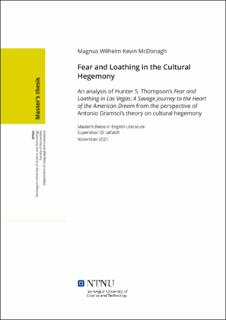| dc.description.abstract | This thesis will analyze Hunter S. Thompson’s Fear and Loathing in Las Vegas: A Savage Journey to the Heart of the American Dream through the lens of Antonio Gramsci’s theory on cultural hegemony. More specifically, this thesis focuses on Duke’s description of American society, and how this description can be analyzed through Gramsci’s theoretical framework. This thesis treats Fear and Loathing in Las Vegas as a fictional work of literature and the protagonist, Raoul Duke, as a fictional character. This means that the description of American society found in Fear and Loathing in Las Vegas is not an objective account from Hunter S. Thompson. In his description of American society, Duke especially focuses on the rule of law, the media, the American Dream and the end of the hippie counter culture. So this thesis will present how these aspects of American society are described and analyze them through Gramsci’s theory on cultural hegemony. The aim of the thesis is not to show whether or not Thompson wrote Fear and Loathing in Las Vegas as a manifestation of Gramsci’s theory. Rather, the thesis aims to see if Gramsci’s theory can give a new way of understanding the novel. | |
